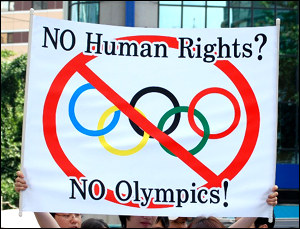| Pamela Sciantarelli looks at China's treatment of the people of Tibet and North Korea |
Ohmynews: Ever since winning the bid to be the hosts of the 2008 Summer Olympics six years ago, China has been under more fire by human rights activists than ever. Issues of sweatshop labor, absence of freedom of speech, religious and thought persecution, and sex trafficking are just a few banners that activists are taking up in attempts to thwart success in the Games.
China also has to worry about outgoing and incoming refugees. Human rights activists recognize refugees as one of the most vulnerable groups of people in the world. Often the lack of protection and a failure to address root causes forcing refugees to flee their homelands result are systemic in the creation of further human rights problems.
With more than 100,000 refugees living in India and around 20,000 more in its closer neighbor, Nepal, the well-being of Tibetans has long been an international concern.
International figure and spiritual leader, the Dalai Lama, has been a voice for Tibet's longstanding desire for sovereignty and freedom from cultural and religious persecution since he escaped Tibet through the tough terrain of the mountainous Himalayas on foot in 1959.
Yet, even with a spiritual guru held in reverence worldwide for nearly half a century speaking on behalf of his people and imparting spiritual truths on all of humanity, Tibet remains a hotbed for human rights abuses.
Most recently, the Chinese government detained four members of the student group -- one Tibetan American in exile and three Americans -- for staging a demonstration at the Mt. Everest Base Camp. A plan for an Olympic-sponsored torch relay over Mt. Everest was the instigating factor for the Everest protest.
Chinese authorities released the activists within a matter of days, but the international organization, Students for a Free Tibet, still sees the Beijing Olympics as very problematic.
"The Chinese government hopes to use the 2008 Olympic Games to conceal the brutality of its occupation of Tibet and win the international community's acceptance as a modern power on the world stage," said Lhadon Tethong, the Executive Director of Students for a Free Tibet, from Kathmandu.
North Korean Refugees
One of the lesser-known evils of China's less than impeccable human rights track record involves the treatment of an ever-growing influx of refugees from its small, but nuclear-toting, neighbor.
An estimated more than 300,000 North Koreans that have fled the closed country to escape hunger and persecution are currently residing in China. Yet, although China has signed the United Nations' 1951 Convention Regarding the Status of Refugees that is intended to grant rights and protection to refugees, the only thing China has done for the refugees to date is send them back to North Korea.
China's rationale for sending the refugees back to North Korea rather than allowing UN-administered assistance to the vulnerable people is that they are "economic migrants" rather than refugees. Economic migrants are categorically individuals only seeking migration for financial gain rather than because of a life or death situation.
However, unlike most countries both signatory to the 1951 Convention and not, China refuses to allow the United Nations High Commission for Refugees (UNHCR) to do its job and make the distinction between economic migrants and bona fide refugees.
The truth of the matter is, once a North Korean crosses the border they become a vulnerable group. Repatriation consequential of further persecution, imprisonment or other means of volatile suffering theoretically entitles any individual refugee protection under the Convention.
 | |
 Protester at one of the daily 444 activities. Protester at one of the daily 444 activities. | |
| ©2007 444 days campaign |
Justice for North Korea is a Seoul-based organization taking on the Chinese government and the Beijing Olympics one person at a time. On May 23, Justice for North Korea began the 444 Days Campaign.
For the 444 days prior to the 2008 Summer Olympics, Justice for North Korea plans to hold at minimum, an ongoing one-person demonstration at the Chinese Consulate in Seoul.
Although one person shouting and holding a sign may seem to have little impact on the Beijing Olympics, the ultimate goal is to heighten awareness about the often swept under the rug situation of North Korean refugees.
JiHye Pak, a founding member of JNK, has recently been suffering from a sore voice.
"Every day I'm shouting," Pak has been present at the Chinese Consulate nearly every day since its kick off a month ago.
And so have the Seoul police. Top sergeants continue to warn Pak and fellow activists that their activities may come with some consequences.
"They can threaten us, but we aren't going to back down," Pak says, "we're not going to back down because what we are doing is not against the law and because there are people going to death because of the Chinese government's failure to abide by International law. If we aren't willing to stand up for them, who is?"
The efforts of groups such as Students for a Free Tibet and Justice for North Korea may seem like drops in the bucket considering the size and strength of China. Yet, regardless of whether or not they are just weak tiger-fighters trying to tackle an untamable beast, the groups refuse to let the 2008 Beijing Summer Olympics happen without a fight.


No comments:
Post a Comment